Natural probiotics can be found in a variety of foods. Find out which might be your gut's new best friend by reading about seven probiotics for health and wellbeing.
We are often confused about the difference between natural prebiotics and natural probiotic foods. A probiotic is best described as actual microorganisms (like bacteria, yeasts or viruses) that naturally occur in foods. Prebiotic foods are those that these microorganisms feed on, like fibre. The human microbiome is the term used to describe the families of microbes that live inside you and the food they feed on.
Research into the human microbiome is still in its infancy, but the findings suggest that biodiversity of the gut has a massive impact on our overall wellbeing and may influence the development of many diseases, including cancer, diabetes and other chronic disorders.
Scientific evidence supports the incorporation of probiotics in nutrition to boost health benefits. It even appears to play a role in our mental and emotional wellbeing too. Making sure you have a happy and diverse community living inside you will promote optimal health and happiness. Here is a list of our favorite natural probiotics.
1. Sauerkraut
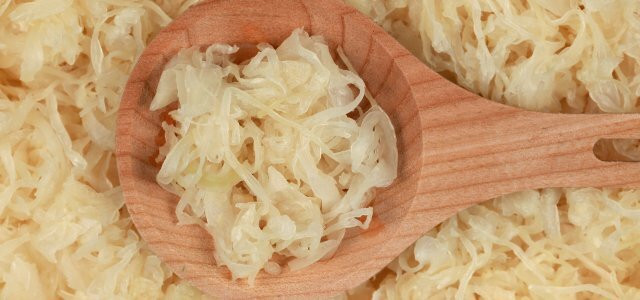
(Foto: Photo: Utopia/Pascal Thiele/ Colourbox.de / #254133)
Sauerkraut is a natural probiotic food made primarily from cabbage and is one of the oldest types of fermented food known to mankind. It has been shown to contain a stable and rapidly established community of probiotics. The Lactobacillus bacteria on cabbage convert its sugars into lactic acid. The result is a tasty and sour food that works well in many dishes, or even as Sauerkraut juice.
Many health-food stores and supermarkets across the U.S. sell sauerkraut. It is best to choose an unpasteurized product, as pasteurization destroys much of the beneficial bacteria. There is strong evidence that sauerkraut provides numerous health benefits, including antioxidant and anticarcinogenic effects. This natural probiotic is fibre-rich and a good source of potassium, vitamin K, vitamin C and other essential nutrients.
Sauerkraut can also be used as a starter culture in other vegetable fermentation processes, but this natural probiotic is not without concern. Its high histamine content can cause some unwanted or even intolerance and allergic reactions for some people, including gut disturbances and systemic reactions. Testing your tolerance levels is advised if sauerkraut is new to your life.
2. Kombucha
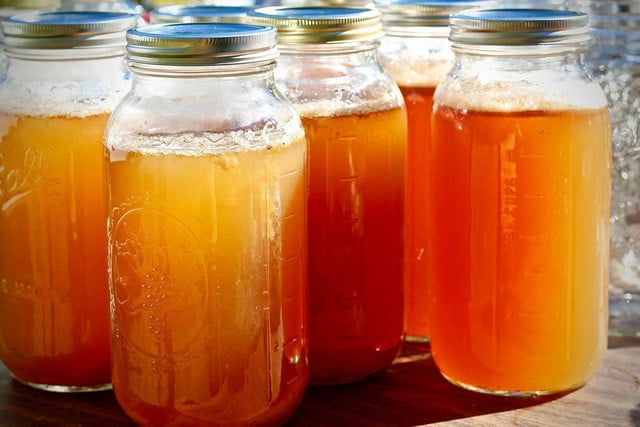


(Foto: CC0 / Pixabay / JennyandtheSummerDay)
Kombucha is an effervescent, fermented tea beverage with a sweet and mildly acidic taste. This lightly sparkling drink is rich in probiotics, vitamins, and minerals, and may even be associated with an array of health benefits such as improved immunity and management of gut disturbances and inflammation.
When kombucha ferments, the process produces a type of acid called acetic acid, which is also present in vinegar. Studies exploring the role of acetic acid show that it may potentially alleviate obesity, diabetes, cardiovascular disease, cancer and other health complications.
This natural probiotic can be poured over ice, mixes well with a variety of fruits — and in some cases, can even bring a pleasant and mild buzz to brain and body. Try kombucha cocktails at home and welcome millions of beneficial live cultures into your body.
3. Kimchi
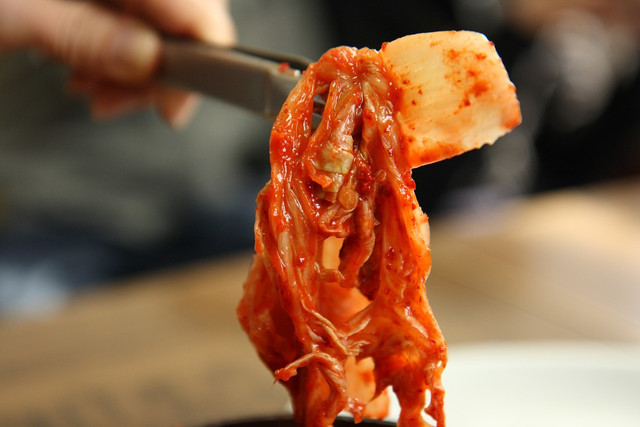


(Foto: CC0 / Pixabay / bourree)
Kimchi is a Korean delicacy that is made in a similar way as sauerkraut. It too contains fermented cabbage but also includes spices and other vegetables – like carrots, garlic, ginger, salt, and chili peppers. All of these ingredients boast an array of health and nutritional benefits individually, and are then loaded with probiotic powers on top.
Vegans should read kimchi labels closely as some brands may contain fish sauce. As well as being a tasty and natural probiotic, studies have shown that the biological compounds in Kimchi can:
- Stimulate the immune system
- Reduce pro-oxidants and free radicals
- Protect against certain cancers
- Protect against cardiovascular disease
- Protect against metabolic syndrome
Kimchi has been found to contribute similar health benefits as yogurt and other dairy probiotic foods. According to the World Wildlife Fund (WWF), dairy farming accounts for a vast collection of environmental decay, such as greenhouse gas emissions, climate change, degradation of local water resources, and deforestation. Making the switch will bring a natural probiotic boost to you and your planet.
4. Miso
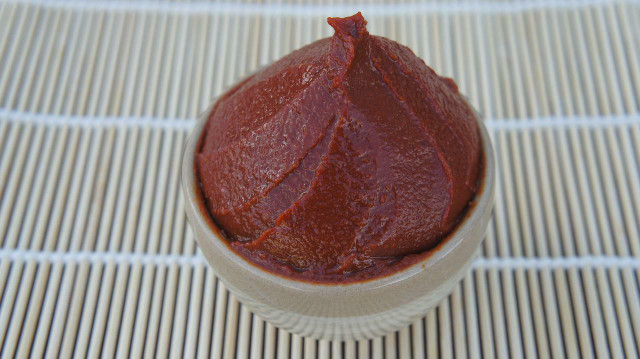


(Foto: CC0 / Pixabay / leeyoping0)
Miso is made by fermenting soy beans with salt and the fungus aspergillus oryzae. This natural probiotic is a traditional ingredient in Japanese cuisine and can be fermented and stored for up to three years before consumption. Miso contains millions of beneficial bacteria and can be easily made into miso butter or miso paste.
Miso is extremely nutritious and the fermentation process used to produce the natural probiotic increases absorption of these nutrients in the body. Nutrients boasted by miso include:
- Fiber
- Protein
- Sodium
- Manganese
- Vitamin K
- Copper
- Zinc
- B Vitamins
- Calcium
- Selenium
This natural probiotic is associated with improved digestive health and has anti-inflammatory properties. Despite being high in salt, Miso does not appear to have the same negative associations as other salty foods. The consumption of fish and meat are linked to a 24–27 percent higher risk of stomach cancer, while miso is not linked to any increased risk. Researchers believe that the beneficial compounds found in fermented soy beans might eliminate the cancer-promoting effects of salt.
5. Tempeh
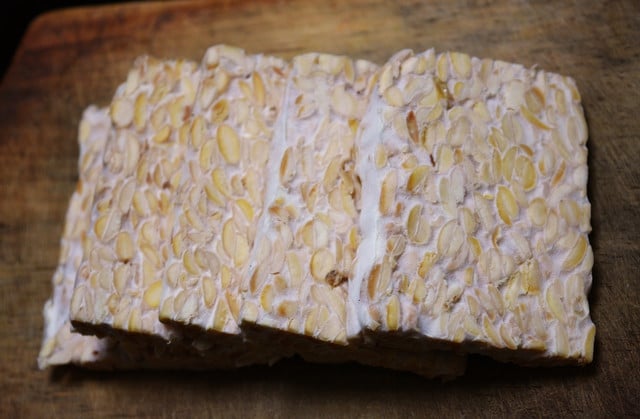


(Foto: CC0 / Pixabay / mochawalk)
Tempeh is also a soy-based food. It is similar to tofu but involves the fermentation of soybeans, which makes it a rich source of live cultures. Research has shown that tempeh is rich in soluble fiber, protein, and boasts a large diversity of beneficial gut microbes.
Its firm texture makes tempeh suitable for use in a variety of ways. Learn how to make tempeh or satisfy your meat cravings by making vegan tempeh bacon, and enjoy the benefits of this natural probiotics.
Soy production is associated with a range of negative environmental impacts. However, many U.S. soy farmers are adopting practices that reduce soil erosion and greenhouse gas emissions while increasing energy use efficiency. So, shopping locally will minimize your own carbon footprint while enjoying this natural probiotic. Research has also concluded that tempeh fermentation is cost-effective, health-promoting, and sustainable food processing technology to produce protein-rich foods. This is particularly apparent in comparison to animal-based probiotic foods.
6. Sourdough
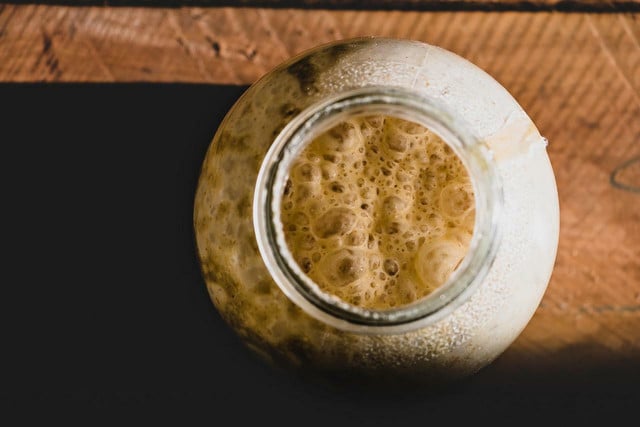


(Foto: CC0 / Pixabay / tombock1)
The probiotics found in sourdough all originate from the starter, which is a primary ingredient in sourdough bread. You can learn how to make your own sourdough starter at home for an endless supply of this natural probiotic. Some lactic acid bacteria strains that are part of the sourdough starter are considered to be natural probiotics with large potential for improving gut and overall health.
The American Society of Microbiology (ASM), state that more than fifty species of lactic acid bacteria and over 20 species of yeast are known to be living in sourdough starters. Not all sourdough breads and products contain probiotics because many are destroyed during baking and some producers do not use fermented starter culture to make their sourdough produce. So, it is important that you check the ingredients and labels first. Even if the probiotics have been killed off, sourdough foods are also a rich source of prebiotics that feed your existing beneficial gut bugs.
7. Kefir Water
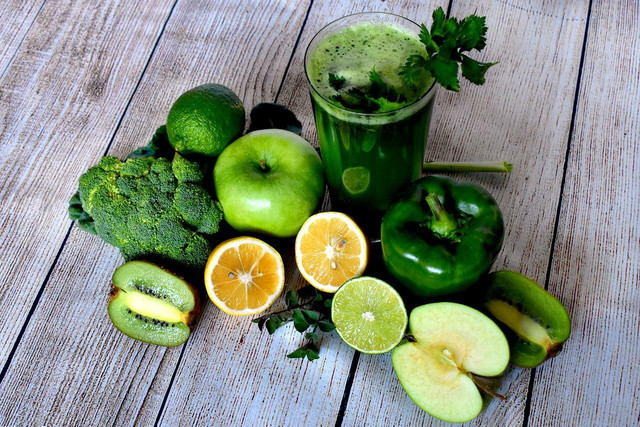


(Foto: CC0 / Pixabay / marijana1)
Kefir is a cultured, fermented, fizzy drink, originally from the mountainous region that divides Asia and Europe. Unlike regular kefir, which is usually made from cow, sheep or goat’s milk, water kefir is made with sugar, water, and kefir grains. These are a grain-like culture of bacteria and yeast. The mixture is then typically fermented for 24–48 hours.
Water kefir is associated with a diverse range of beneficial yeast and bacteria. It is being studied all over the world and is linked to a variety of anti-cancer and anti-inflammatory effects. The Lactobacillus strains of bacteria that are present in kefir are also being studied for their role in weight management. You can easily make this natural probiotic at home with a 2 ingredient recipe.
Read more:
- How to Ferment Vegetables: A Beginner’s Guide – Utopia
- Fermented Black Garlic: The Trend, Uses, and Health Benefits
- The 7 Best Yogurt Alternatives: Natural & Delicious
Important Information regarding Health-related Topics.
** Links to retailers marked with ** or underlined orange are partially partner links: If you buy here, you actively support Utopia.org, because we will receive a small part of the sales proceeds. More info.Do you like this post?







